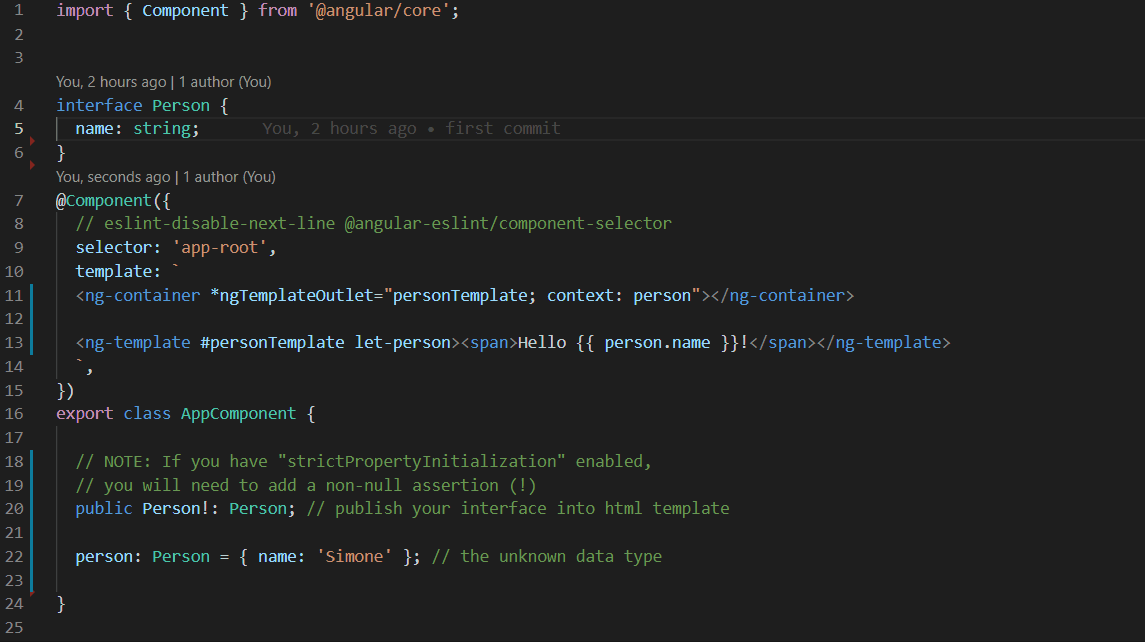NgAs 


Angular pipe and directive for type casting template variables.
Description
Sometime there is a need to cast variable into component template as some type.
This library has pipe and directive for type casting template variables and improve IDE suggestion and refactoring.
See the stackblitz demo.
Get Started
Step 1: install ng-as
npm i ng-as
Step 2: Import NgAsModule into your app module, eg.:
import { BrowserModule } from '@angular/platform-browser';
import { NgModule } from '@angular/core';
import { CommonModule } from '@angular/common';
import { AppComponent } from './app.component';
import { NgAsModule } from 'ng-as';
@NgModule({
declarations: [AppComponent],
imports: [
BrowserModule,
CommonModule,
NgAsModule,
],
providers: [],
bootstrap: [AppComponent],
],
})
export class AppModule { }
Step 3: usage
type casting template variables with directirve eg.:
import { Component } from '@angular/core';
interface Person {
name: string;
}
@Component({
selector: 'app-root',
template: `
<ng-container *ngTemplateOutlet="personTemplate; context: {$implicit: person}"></ng-container>
<ng-template #personTemplate [ngAs]="Person" let-person>
<span>Hello {{ person.name }}!</span>
</ng-template>
`,
})
export class AppComponent {
public Person!: Person;
person: Person = { name: 'Simone' };
}
type casting template variables with pipe eg.:
import { Component } from '@angular/core';
interface Person {
name: string;
}
@Component({
selector: 'app-root',
template: `
<ng-container *ngTemplateOutlet="personTemplate; context: {$implicit: person}"></ng-container>
<ng-template #personTemplate let-person>
<span>Hello {{ (person | as: Person).name }}!</span>
</ng-template>
`,
})
export class AppComponent {
public Person!: Person;
person: Person = { name: 'Simone' };
}
That's all!

Example: MatTable
matCellDef cannot infer the type of its parent's input. But with ng-as you can strong-type its template variable.
import {Component} from '@angular/core';
export interface PeriodicElement {
name: string;
position: number;
weight: number;
symbol: string;
}
const ELEMENT_DATA: PeriodicElement[] = [
{position: 1, name: 'Hydrogen', weight: 1.0079, symbol: 'H'},
{position: 2, name: 'Helium', weight: 4.0026, symbol: 'He'},
{position: 3, name: 'Lithium', weight: 6.941, symbol: 'Li'},
{position: 4, name: 'Beryllium', weight: 9.0122, symbol: 'Be'},
{position: 5, name: 'Boron', weight: 10.811, symbol: 'B'},
{position: 6, name: 'Carbon', weight: 12.0107, symbol: 'C'},
{position: 7, name: 'Nitrogen', weight: 14.0067, symbol: 'N'},
{position: 8, name: 'Oxygen', weight: 15.9994, symbol: 'O'},
{position: 9, name: 'Fluorine', weight: 18.9984, symbol: 'F'},
{position: 10, name: 'Neon', weight: 20.1797, symbol: 'Ne'},
];
@Component({
selector: 'table-basic-example',
template: `
<table mat-table [dataSource]="dataSource" class="mat-elevation-z8">
<ng-container matColumnDef="position">
<th mat-header-cell *matHeaderCellDef> No. </th>
<td mat-cell *matCellDef="let element"> {{(element | as: PeriodicElement).position}} </td>
</ng-container>
<ng-container matColumnDef="name">
<th mat-header-cell *matHeaderCellDef> Name </th>
<td mat-cell *matCellDef="let element"> {{(element | as: PeriodicElement).name}} </td>
</ng-container>
<ng-container matColumnDef="weight">
<th mat-header-cell *matHeaderCellDef> Weight </th>
<td mat-cell *matCellDef="let element"> {{(element | as: PeriodicElement).weight}} </td>
</ng-container>
<ng-container matColumnDef="symbol">
<th mat-header-cell *matHeaderCellDef> Symbol </th>
<td mat-cell *matCellDef="let element"> {{(element | as: PeriodicElement).symbol}} </td>
</ng-container>
<tr mat-header-row *matHeaderRowDef="displayedColumns"></tr>
<tr mat-row *matRowDef="let row; columns: displayedColumns;"></tr>
</table>
`,
})
export class TableBasicExample {
PeriodicElement!: PeriodicElement;
displayedColumns: string[] = ['position', 'name', 'weight', 'symbol'];
dataSource = ELEMENT_DATA;
}
Support
This is an open-source project. Star this repository, if you like it, or even donate. Thank you so much!
My other libraries
I have published some other Angular libraries, take a look:





